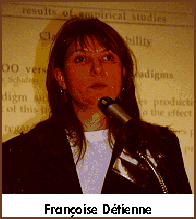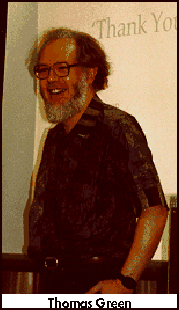Issue
Article
Vol.28 No.3, July 1996
Article
Issue
Issue |
Article |
Vol.28 No.3, July 1996 |
Article |
Issue |
It sounds like a variation on the "desert island" game. If you were to be stranded on a desert island with 55 other people, who would you pick? Although we do not know about the desert island case, we can attest that upon being stranded by the greatest snowstorm to hit the east coast of North America in 70 years, the 55 delegates of ESP6 proved to be intelligent and able companions who turned a potential disaster into a social occasion and an intellectual feast.
The pre-workshop tutorial by Robert Rist on A Cognitive Architecture for Programming Design: Zippy's TOE began under clear skies on Friday afternoon (5 Jan). We officially convened Friday evening with ESP's usual opening reception and poster session. Posters were presented by John Daly, Vicki Fix, Dennis Goldenson, Darryn Lavery and Theresa Shaft. The delegates wandered about, talking to the poster presenters and each other while enjoying microbrews (beers made by small, regional breweries), Virginia wines, and a large quantity of hot and cold finger food.
The long Saturday session began with a buffet breakfast at 07:15. Technical sessions began at 08:00 with an invited address by Thomas Green. ESP6 recognized Thomas for his career contributions to the empirical studies of programmers' community. The award recognized Thomas for his original research contributions as well as for his encouragement and support of others in the field.
Saturday morning continued with two sessions punctuated by a break. The first session, Theories of Programming, included research presentations by Robert Rist and Deborah Boehm-Davis. The second session, Transfer & Maintenance, included presentations by Susan Wiedenbeck, Christopher Roast, and John Daly. The meeting continued over a buffet lunch with Françoise Détienne's excellent and scholarly review of empirical research on object oriented programming.

The afternoon research session on graphical representations, display-based problem solving and visual languages included papers by Judith Good, Simon Davies, Edward Gould, and Francesmary Modugno. After a break, we had a panel session, organized by Dennis Goldenson, on the use of designed experiments in software engineering (with Dennis, Victor Basili, Carmen Trammell, Khaled El Eman, and Robert Stoddard as panelists). The panel evoked a lively discussion concerning the relationship between the organization and management issues of concern to software engineering versus ESP's traditional concerns with programmers working as individuals and in teams.
Dinner was held in a tavern preserved from colonial days in the heart of Old Town Alexandria. The dinner included entertainment by a colonial balladeer, who regaled the group with song and verse in old English, French, Spanish, and German! The assembled group also heard a "roast" of Thomas Green written by Bill Curtis and limericks written by the assembled group, followed by the presentation of a "virtual" plaque (delayed by Federal Express) and an album of photos and remembrances to Thomas. The award recognized Thomas for "...his pioneering empirical research on programming, his leadership in developing the field, his clever contributions to science and computing, his dedication to empirical methods, his convivial spirit, and his inspiration to a generation of scientists. This award conveys the admiration and affection of his colleagues." By the evening's end, there was about two inches of snow but not enough to deter some brave souls from walking the nine blocks back to the hotel.
Sunday morning was a different story. We awoke to a white world and news of closed airports. Given the realization that no one who had stayed at the hotel would be leaving anytime soon, we progressed through the Sunday schedule at a leisurely pace. This included research papers on Teaching Programming, with presentations by Christopher Hoadley, Thomas Ormerod, and Judith Segal. After a long break (while delegates attempted to contact their airlines), we had a panel session on Empirical Studies of Programming Organizations. Thea Turner organized this session which included participation by Robin Jeffries, James Herbsled, and a "virtual" Bill Curtis (Bill was unable to attend due to a family emergency but had faxed his slides to Thea Turner). Unfortunately, since the snow prevented some hotel workers from getting into the office, no one had a key to the room containing the copy machine. As a result, Bill's slides were "copied" as in the Middle Ages, by scribes who put pen to transparency.
The end of the panel session was the official close of the workshop. However, as no one was able to enter or leave the hotel, we immediately organized ESP6.1. After an impromptu lunch in the hotel restaurant, the majority of the delegates reconvened for a rump session. We discussed a number of issues, including how we might better connect with industrial partners, how we might improve the conference, and when we might hold the next one. Dinner was a buffet for 30 (again in the hotel restaurant).
After dinner, Thomas Green led the assembled group in dancing jigs and reels (he having brought with him some tapes with appropriate music). The dancers eventually adjourned to the hotel bar, which, fortunately, was well stocked. Monday morning, with airports closed and most local roadways still impassable, early risers organized ESP6.2 (AKA the Everlasting Studies of Programmers) and "scheduled" a tutorial for later in the morning. Pierre Robillard conducted the tutorial on Schemacode, a knowledge based software development tool. After the tutorial, the assembled group, being very appreciative but very tired of hotel food, formed a field group who attempted to find an open restaurant within walking distance of the hotel. Unfortunately, there was not one. At this point, 24+ hours beyond the official end of ESP6, large group activities ended while many smaller, 2-3 person activities picked up. Although quite a bit of the discussion concerned how we were going to get out of the hotel and to our respective homes, we are told that some of our group actually got together and worked on long-delayed, collaborative projects. When the sun came out and the snow plows cleared a path, the workshop co-chairs abandoned the hotel and made their way home to family.

From Monday afternoon through Thursday, individuals set out as they could, leaving by car, train, or plane. However, by Tuesday evening 15-20 delegates were still stuck at the workshop hotel. The conference co-chairs, feeling guilty about having abandoned ship, drove back (in a 4-wheel drive vehicle) to have dinner and bring relief packages to the survivors. A group of 12 had dinner in Old Town, amused ourselves with neon bracelets and tops, and eagerly divied up the mystery novels provided by one of the co-chairs (dab). The last of the delegates (including one member of the conference's organizing committee) escaped the hotel on Thursday.
In these days of email and web-servers, some may question the role or necessity of small, research-oriented workshops. But research areas develop identities and personalities much as individuals do. Small workshops are the single best way of renewing personal contacts, getting caught up with a wide variety of research programs and meeting new researchers with new ideas. They renew the vision that, yes, these are interesting and important topics, and this is an interesting and important domain. Although seldom discussed in graduate training, somehow it helps ones day-to-day sense of purpose and willingness to pursue difficult questions in a demanding domain if we respect our fellow researchers personally as well as intellectually. Such a role, we feel, can best be filled by a small, research-oriented workshop and, in our humble opinion (as co-organizers) ESP6 (as well as 6.1 and 6.2) filled this role well.
Deborah A. Boehm-Davis and Wayne D. Gray
MSN 3F5
George Mason University
Fairfax, VA 22030-4444, USA
dbdavis@gmu.edu
gray@gmu.edu
Issue |
Article |
Vol.28 No.3, July 1996 |
Article |
Issue |